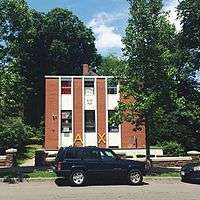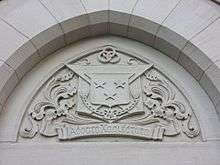Cleo of Alpha Chi
| Cleo of Alpha Chi | |
|---|---|
| ΑΧ | |
 | |
| Founded |
1877 Trinity College |
| Type | Literary and Social |
| Scope | Local |
| Colors |
Crimson, Gold and Navy |
| Symbol | Borromean rings, Phoenix |
| Chapters | 1 |
| Members |
30 collegiate 1000+ lifetime |
| Also Known As | The Clio, Alpha Chi of Delta Kappa Epsilon (1879-1990) |
| Headquarters |
98 Vernon Street Hartford, Connecticut United States |
| Homepage | |
The Cleo of Alpha Chi Literary Society is a secret coeducational literary society at Trinity College in Hartford, Connecticut, United States of America. The society was founded in 1877 as the Clio Society and received a charter from Delta Kappa Epsilon, becoming the latter's Alpha Chi chapter, in 1879. After Trinity College became a coeducational institution in 1969, Alpha Chi became the first DKE chapter and the first Trinity College fraternity to admit women. In 1990 the society once again became independent after its charter was revoked for its inclusion of female members.
The society, commonly known to Trinity students simply as Cleo, has distinguished itself, both on campus and as a part of the wider Hartford community, for its public, sometimes controversial, dedication to tolerance and is frequently involved in collaborations with on-campus groups that focus on issues including gender equality, cultural diversity, and LGBT concerns.[1] Cleo is also noted for its promotion of literary and arts interests, including hosting and supporting musical showcases and poetry slams.
History
The Clio literary society was founded at Trinity College in 1877 by six members of the class of 1880.[2] John Chester Barrows, Lawson Brewer Tidwell, Harry Campbell Black, Arthur William Burroughs, David Law Fleming and Henry McBride, formerly members of the 'Sophomore Literary Society', founded the Clio society with the intention of reviving a tradition of literary societies following the college's relocation from a location in downtown Hartford, adjacent to Bushnell Park, to its present location at Gallows Hill.[3] In the wake of this relocation and the presence of other social options such as the nationally-affiliated fraternities, literary societies and their activities including debate and declamation, had become less popular among the student body.[4] Ironically, only two years later, the Clio literary society received its charter from the national fraternity Delta Kappa Epsilon, becoming the Alpha Chi chapter in 1879 [5]

The organization continued as a chapter of one of four national social fraternities represented at Trinity College, along with Alpha Delta Phi, St. Anthony Hall and Psi Upsilon. The fraternities were fully recognized by and embedded in the fabric of the college; Jarvis hall, a constituent building of Trinity's historic Long Walk, housed dining quarters for each one including Delta Kappa Epsilon, and the crest of Alpha Chi remains engraved above a door to the hall, now a dormitory.[6] The Alpha Chi chapter also maintained an eating club located at 73 Allen place in addition to its chapter house at number 20.[7]
The years between the adoption of Alpha Chi's DKE charter and the Second World War were relatively stable in the history of the chapter. These years were marked most significantly by the relocation of both the eating club and chapter house to the society's present location at 98 Vernon Street. Between 1943 and 1946, this building became a part of Trinity's involvement in the United States Navy]'s V-12 training program, which supported further infrastructural developments and sustained the chapter during the war years.
In 1969, Trinity College became a coeducational institution. Following this change, Alpha Chi began admitting women to its membership in 1970, becoming the first fraternity at Trinity and the first DKE chapter to do so. The chapter's acceptance of women went unquestioned until 1988, when a fire at the chapter house prompted Alpha Chi to request renovation funds from the Delta Kappa Epsilon international organization. After sending female officers to meet with officers at the DKE international headquarters, the chapter was placed on probation and subsequently had its charter revoked in 1990. In response to this reaction from DKE, the society reinvented itself as the non-selective fraternity 'Alpha Chi'.[8]
Events surrounding the newly unaffiliated coeducational organization prompted national coverage and, along with other fraternities at colleges such as Middlebury sparked a discussion surrounding the issue of coeducational Greek letter organizations.[9][10]
Present Day
Following Alpha Chi's disaffiliation from Delta Kappa Epsilon and the transition to its present name, 'Cleo of Alpha Chi', the society's activities reoriented towards a focus on social activism. The new direction has led to controversy surrounding Cleo of Alpha Chi's agenda, including rivalries with the more traditional and conservative St. Anthony Hall and the Order of the Elm and Key, which seeks to promote leadership at Trinity. Thse rivalries have occasionally come to light despite the organizations' attempts at secrecy, such as the alleged 2013 theft by Cleo members of important college artifacts in Elm and Key's possession, and a break in at 98 Vernon Street by a member of St. Anthony Hall in 2015. Despite these controversies, Cleo has remained dedicated to involvement with on-campus organizations for the LGBT community and combatting racism and sexism.[11][12]
Membership
Although historically comprising a predominantly white male membership, the present incarnation of Cleo of Alpha Chi admits members on a non-discriminatory basis regardless of attributes such as race, social class, or gender identity. The chapter was the first fraternity at Trinity College to admit women following the college's own transition to coeducation in 1969.[9]
Membership has also at times been granted to students of other nearby institutions, such as the University of Hartford and the University of Connecticut, although changes to the Trinity College social policy led to the end of this practice.[13]
Notable members
- Henry Campbell Black, Clio Society founder, and creator of Black's Law Dictionary
- Christine Quinn, New York City politician
References
- ↑ Laws, Joseph (February 7, 2012). "Social Policy Combats Discrimination at Trinity". The Trinity Tripod.
- ↑ Wilson, David B.; Bailey, Melville K., eds. (February 23, 1878). The Trinity Tablet. XI (II ed.). Trinity College. p. 20.
- ↑ "IX". The Trinity Tablet (IX ed.). October 7, 1879. pp. 102–103.
- ↑ Glenn, Weaver (1967). "10". The History of Trinity College. 1. Hartford, Connecticut: The Trinity College Press.
- ↑ The Hartford Daily Courant. May 9, 1879. Missing or empty
|title=(help) - ↑ "Trinity College". The Harvard Crimson. Harvard University. October 26, 1887.
- ↑ Glenn, Weaver (1967). "10". The History of Trinity College, Volume 1. Hartford, Connecticut: The Trinity College Press. p. 217.
- ↑ Uncredited (May 8, 1990). "Fraternity Loses Charter For Being Co-Ed" (Vol. LXXXVII, Issue II). Trinity College. The Trinity Tripod.
- 1 2 Borg, Erik (April 8, 1990). "Campus Life; The Idea of Coeducational Fraternities Is Catching On in the Northeast". The New York Times.
- ↑ Freedman, Samuel G. (February 7, 1983). "Trinity College Debates the Banning of Fraternities". The New York Times.
- ↑ Pickens, Allison (October 20, 2009). "Cleo Party Title Brings About Harsh Backlash". The Trinity Tripod. Trinity College.
- ↑ Bellard, Aurora (October 29, 2014). "EROS teams up with a variety of student organizations for Ally Week". Trinity College. The Trinity Tripod.
- ↑ "Report of The Charter Committee for Building Social Community at Trinity College" (PDF). Trinity College Board of Trustees.